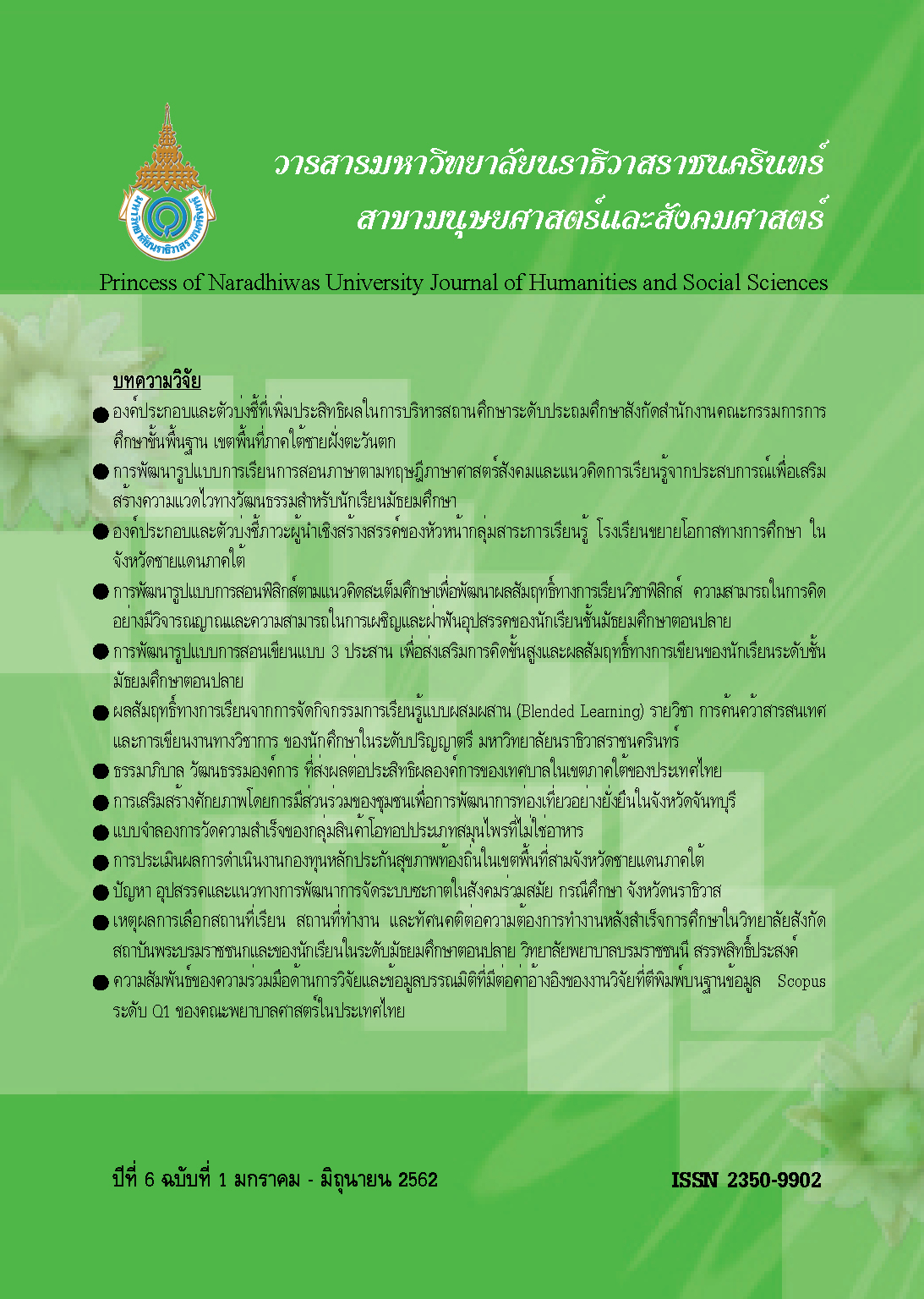องค์ประกอบและตัวบ่งชี้ภาวะผู้นำเชิงสร้างสรรค์ของหัวหน้ากลุ่มสาระการเรียนรู้ โรงเรียนขยายโอกาสทางการศึกษา ในจังหวัดชายแดนภาคใต้
Main Article Content
บทคัดย่อ
การวิจัยนี้ใช้วิธีวิจัยแบบผสมวิธีมีวัตถุประสงค์ เพื่อศึกษาและวิเคราะห์องค์ประกอบและตัวบ่งชี้ภาวะผู้นำเชิงสร้างสรรค์ของหัวหน้ากลุ่มสาระการเรียนรู้ โรงเรียนขยายโอกาสทางการศึกษา ในจังหวัดชายแดนภาคใต้ ดำเนินการวิจัย 2 ระยะ คือ 1) การกำหนดองค์ประกอบและตัวบ่งชี้ภาวะผู้นำเชิงสร้างสรรค์ของหัวหน้ากลุ่มสาระการเรียนรู้ โดยศึกษาเอกสาร งานวิจัย และสัมภาษณ์เชิงลึกผู้รู้ ผู้มีประสบการณ์ จำนวน 7 คน และ2 ) การวิเคราะห์องค์ประกอบเชิงสำรวจ กลุ่มตัวอย่าง ได้แก่หัวหน้ากลุ่มสาระการเรียนรู้ โรงเรียนขยายโอกาสทางการศึกษา ในจังหวัดชายแดนภาคใต้ จำนวน 200 คน ใช้วิธีการสุ่มอย่างง่าย ด้วยวิธีจับฉลากแบบไม่ใส่คืน เครื่องมือที่ใช้เป็นแบบสอบถาม จำนวน 80 ข้อ ผ่านการตรวจสอบความเที่ยงตรงเชิงเนื้อหา โดยใช้ค่า CVI ได้ค่าดัชนีความเที่ยงตรงทั้งฉบับ เท่ากับ .96 หาค่าความเชื่อมั่นโดยใช้สัมประสิทธิ์แอลฟ่าของครอนบาค ทั้งฉบับได้ค่า เท่ากับ .95 วิเคราะห์ข้อมูลโดยใช้เทคนิคการวิเคราะห์องค์ประกอบเชิงสำรวจ โดยวิธีหมุนแกนองค์ประกอบแบบออบลิค ด้วยวิธีโปรแม็กซ์ (Promax)
ผลการวิจัยพบว่า องค์ประกอบและตัวบ่งชี้ภาวะผู้นำเชิงสร้างสรรค์ของหัวหน้ากลุ่มสาระการเรียนรู้ โรงเรียนขยายโอกาสทางการศึกษา ในจังหวัดชายแดนภาคใต้ มี 10 องค์ประกอบ 61 ตัวบ่งชี้ ได้แก่ การปรับตัว มี 6 ตัวบ่งชี้ ผู้นำการเปลี่ยนแปลง มี 5 ตัวบ่งชี้ ความฉลาดทางอารมณ์ 5 ตัวบ่งชี้ การสร้างวิสัยทัศน์ 8 ตัวบ่งชี้ การสื่อสารและปฏิบัติตามวิสัยทัศน์ 10 ตัวบ่งชี้ ความคิดริเริ่ม 6 ตัวบ่งชี้ ความคิดนอกกรอบ 6 ตัวบ่งชี้ ความต้องการความสำเร็จ 6 ตัวบ่งชี้ ทิศทางและเป้าหมาย 4 ตัวบ่งชี้ และความพึงพอใจในงาน 5 ตัวบ่งชี้
Article Details
เอกสารอ้างอิง
กระทรวงศึกษาธิการ. (2556). แผนพัฒนาการศึกษาชายแดนภาคใต้ของกระทรวงศึกษาธิการ 2557-2558 .ม.ป.พ.
กิตติ์กาญจน์ ปฏิพันธ์. (2555). โมเดลสมการโครงสร้างภาวะผู้นำเชิงสร้างสรรค์ของผู้บริหารสถานศึกษาอาชีวศึกษา. วิทยานิพนธ์ปรัชญาดุษฎีบัณฑิต สาขาวิชาการบริหารการศึกษาบัณฑิตวิทยาลัย มหาวิทยาลัยขอนแก่น.
เกรียงศักดิ์ เจริญวงศ์ศักดิ์. (2553). การคิดเชิงสร้างสรรค์. กรุงเทพฯ : ซัคเซสมีเดีย
ชัยเสฏฐ์ พรหมศรี. (2557). ภาวะผู้นำร่วมสมัย. กรุงเทพฯ: ปัญญาชน.
ชาญชัย อาจินสมาจาร. (2550). ภาวะผู้นำในองค์การ. กรุงเทพฯ: ปัญญาชน.
บุญเสริม วีสกุล. (2552).วิกฤติภาวะผู้นำทางการศึกษา. กรุงเทพฯ: มหาวิทยาลัยธุรกิจบัณฑิตย์.
พนัส ถิ่นวัน. (2556). รูปแบบการพัฒนาภาวะผู้นำเชิงสร้างสรรค์ของผู้บริหารโรงเรียนประถมศึกษาขนาดเล็กในภาคตะวันออกเฉียงเหนือ. วิทยานิพนธ์ครุศาสตรดุษฎีบัณฑิต สาขาภาวะผู้นำทางการบริหารการศึกษา มหาวิทยาลัยราชภัฏสกลนคร.
ไพฑูรย์ สินลารัตน์. (2553). ผู้นำเชิงสร้างสรรค์และผลิตภาพ : กระบวนทัศน์ใหม่และผู้นำใหม่ทางการศึกษา.กรุงเทพฯ : โรงพิมพ์จุฬาลงกรณ์มหาวิทยาลัย.
มณฑาทิพย์ เสยยงคะ. (2556). การพัฒนาตัวบ่งชี้ภาวะผู้นำเชิงสร้างสรรค์ของผู้บริหารสถานศึกษา สำนักงานส่งเสริมการศึกษานอกระบบและการศึกษาตามอัธยาศัย สำนักงานปลัดกระทรวงศึกษาธิการ. วิทยานิพนธ์ครุศาสตรดุษฎีบัณฑิต สาขาการบริหารจัดการศึกษา มหาวิทยาลัยราชภัฏมหาสารคาม.
ลักขณา สริวัฒน์. (2549). การคิด Thinking. กรุงเทพฯ: โอ.เอส.พริ้นติ้ง เฮ้าส์.
วัชรินทร์ หนูสมตน. (2553). การวิจัยผสานวิธี : ความทุ่มเทในการทำงานของครูในพื้นที่พหุวัฒนธรรมสามจังหวัดชายแดนภาคใต้. วิทยานิพนธ์ปรัชญาดุษฎีบัณฑิต สาขาวิชาจิตวิทยาอุตสาหกรรมและองค์การ มหาวิทยาลัยเทคโนโลยีพระจอมเกล้าพระนครเหนือ.
วีระวัฒน์ ดวงใจ. (2556). รูปแบบการพัฒนาภาวะผู้นำการเปลี่ยนแปลงของหัวหน้ากลุ่มสาระการเรียนรู้ในโรงเรียนมัธยมศึกษา สังกัดสำนักงานเขตพื้นที่มัธยมศึกษา เขต 22 และเขต 23. วิทยานิพนธ์ครุศาสตรดุษฎีบัณฑิต สาขาภาวะผู้นำทางการบริหารการศึกษา มหาวิทยาลัยราชภัฏสกลนคร.
ศักดิ์ระภี วรวัฒนะปริญญา. (2556). อิทธิพลเชิงโครงสร้างการรับรู้ภาวะผู้นำการเปลี่ยนแปลงที่มีต่อผลการปฏิบัติงานของอาจารย์สถาบันอุดมศึกษาเอกชน. วิทยานิพนธ์บริหารธุรกิจดุษฎีบัณฑิต มหาวิทยาลัยรามคำแหง.
ศิริพร กุลสานต์. (2557). รูปแบบการพัฒนาภาวะผู้นำครูในการจัดการเรียนรู้ในโรงเรียนขยายโอกาสทางการศึกษา ภาคตะวันออกเฉียงเหนือ. วิทยานิพนธ์ครุศาสตรดุษฎีบัณฑิต สาขาภาวะผู้นำทางการบริหารการศึกษา มหาวิทยาลัยราชภัฏสกลนคร.
สัมฤทธิ์ กางเพ็ง. (2557). ภาวะผู้นำเชิงวิสัยทัศน์ แนวคิด ทฤษฎี และกรณีศึกษา. ขอนแก่น: อภิชาติการพิมพ์
สำนักงานเลขาธิการสภาการศึกษา กระทรวงศึกษาธิการ. (2552). ข้อเสนอการปฏิรูปการศึกษาในทศวรรษที่สอง. กรุงเทพฯ: พริกหวานกราฟฟิค.
_________. (2558). IMD 2015 จัดอันดับขีดความสามารถในการแข่งขันของประเทศไทย.มองสถิติและตัวชี้วัดทางการศึกษา.ปีที่ 2 ฉบับที่ 1 มิถุนายน 2558. สืบค้นเมื่อ 12 มีนาคม 2559 จากhttp://www.onec.go.th/onec_web/page.php?mod=Book&file=register_short&bid=1421
อรปวีณ์ สุตะพาหะ. (2554). แบบจำลองความสัมพันธ์เชิงสาเหตุของพฤติกรรมการเป็นสมาชิกที่ดีต่อองค์การของหัวหน้ากลุ่มสาระการเรียนรู้ในสถานศึกษาขั้นพื้นฐาน. วิทยานิพนธ์ศึกษาศาสตรดุษฎีบัณฑิต สาขาการบริหารการศึกษา มหาวิทยาลัยเกษตรศาสตร์.
อิศรัฏฐ์ รินไธสง. (2558). การวิเคราะห์ข้อมูลเชิงปริมาณขั้นสูง สำหรับการวิจัยทางพฤติกรรมศาสตร์. สงขลา : ภาควิชารัฐศาสนศาสตร์ คณะวิทยาการจัดการ มหาวิทยาลัยสงขลานครินทร์.
Colaizzi, P. (1978). Psychological research as the Phenomenologist views it. In Existential-Phenomenological Alternativea for Psychology. (Valle R.& King M.eds), Oxford University Press, London.
Cronbach, L.J. (1951). Essentials of Psychological Testing.(3rd ed). New York: Harper&Row.
Hair, F.J., Back ,C.W., Babin, J.B., & Anderson, E.R. (2010). Multivarirte Data Analysis. (7th ed). New Jersey: Pearson Education.
Harris, A. (2009). Creative Leadership Developing Future Leaders. Journal of Management in Education, 23(1), pp 9-11.
Manning, T., & Robertson, B. (2002). The Dynamic Leader-Leadership Development Beyond the Visionary Leader. Industrial and Commercial Training, 34(1), pp. 137-143.
Stoll, L.& Temperley, J.(2009). Creative Leadership : A challenge of our times. School Ledership and Managament, 29 (1), pp 63-76.
Vygotsky, L. (2004). Imagination and Creativity in Childhood. Journal of Russian and East European Phychology. 42(1), pp. 7-97
Yukl, G. & Mahsud, R. (2010). Why Flexible and Adaptive Leadership is Essential. Consulting Psychology Journal : Practice and Research. 62 (2), pp 81-93


